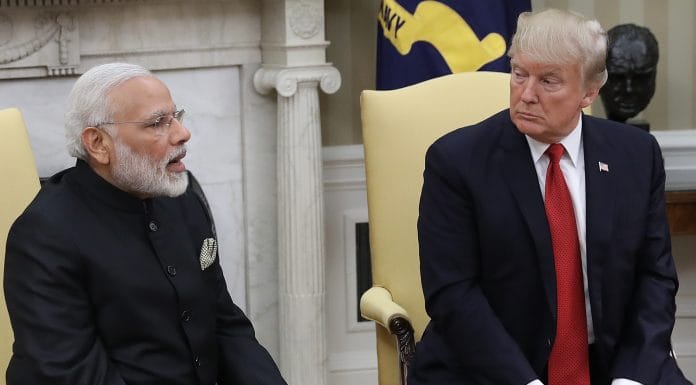First China. Now India?
In recent months, President Donald Trump has made clear that the trade war will reach beyond the People’s Republic. Not only has he threatened Japan and Europe with import duties on cars, he’s repeatedly blasted India as “the tariff king.”
Trump has obsessed over the Asian giant’s high levies on Harley-Davidson motorcycles and complained about its modest $24.3 billion surplus in trade with the U.S. In March, the president gave Congress notice that he plans to terminate duty-free privileges for $5.6 billion worth of Indian exports to the U.S. He could do so at any moment.
And Trump may not stop there. His administration is toying with the idea of exercising the same legal authority used to levy unilateral tariffs against China to impose higher duties on India. Imagine the world’s largest democracy, which Washington has diligently sought to enlist as an ally against Beijing, being lumped together with America’s main strategic competitor.
India represents the rare bright spot in U.S. foreign policy. With much difficulty, a years-long, bipartisan effort has greatly deepened ties with the prickly emerging power. Once considered the ultimate swing state, India is now seen as the fulcrum of the White House’s Asia strategy.
Also read: US and China’s trade war threatens to stymie growing world economy
Trump’s trade tactics appear to reflect a belief that the U.S. can fight tooth-and-nail with friends such as Europe and Japan without jeopardizing broader strategic ties or undermining efforts to balance China. Even in the unlikely event he’s right, given that those longtime allies count on the U.S. security umbrella, that’s hardly a winning play in India.
The country hasn’t entirely shed a post-colonial mindset; it fervently values its autonomy and its place as a non-aligned nation. Regardless of how powerful strategic ties have grown in recent years, India still has no interest in a formal alliance with the U.S.
Successive U.S. administrations have generally been willing to respect India’s choices. At the same time, they’ve quietly labored to strengthen habits of cooperation. Through a series of actions — in particular a civilian nuclear agreement reached in 2005 — these administrations have effectively declared: “India’s rise lies in America’s interests.”
If frictions were now limited to trade, those common interests might provide enough glue to maintain this positive momentum. Instead, the Trump administration’s complaints have expanded to include demands that India cut oil imports from Iran to zero and abruptly end significant arms purchases from Russia, or else face sanctions. The president has even belittled India’s significant development contributions in Afghanistan.
All this only reinforces the suspicions some Indians still hold about U.S. reliability. Being a stakeholder in India’s future implicitly requires trading some short-term gains for more important long-term returns. The Trump administration should remember that an economically vibrant India will also be a much more capable strategic partner.
A hasty step such as removing developing-nation trade benefits, on the other hand, could begin to undermine the core logic of the partnership. Whatever government emerges from Indian elections that conclude later this month may well decide it has little choice but to respond with retaliatory duties.
This would run counter to India’s own interests, of course. A trade confrontation with the U.S. would undermine its argument that global companies should choose its huge, young, tech-savvy market as an alternative to China. Foreign investment is crucial to helping India develop its economy and play a more robust regional role.
It’s also worth pointing out that Trump is not entirely wrong. India is in need of trade reform and could have taken useful steps after Washington launched an April 2018 investigation into its practices and before the onset of the current political season. Instead New Delhi made scant progress and even slid backwards. The new government should swiftly revisit illiberal trade policies that hamper India’s regional economic integration, exports, global competitiveness and labor productivity.
Also read: US-China trade war: Here’s why the tariff tiff has stock markets in a fix
A number of those policies are actually designed with China in mind. Like the U.S., India runs by far its largest trade deficit with its wealthier neighbor. If just afforded a chance, it might quietly lend a hand to U.S. efforts to change China’s trade approach.
The Trump administration should give Indian leaders at least a couple months to get organized and draft some serious proposals, including on e-commerce restrictions. While the U.S. dukes it out with China, India can hopefully get its act together and give Trump less incentive to launch another ill-advised trade assault. – Bloomberg
Atman Trivedi is managing director at international consultancy Hills & Co. He previously served as senior director for policy in global markets at the U.S. Commerce Department and chief of staff in the State Department’s international security and nonproliferation bureau.






